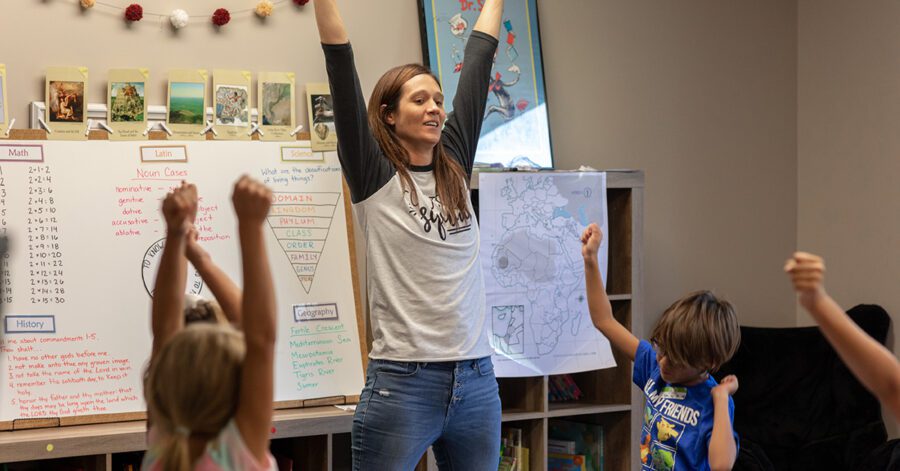If the public school system’s education of the special needs student is a never stopping, never diverting conveyer belt leading children from one stop to another with little and sometimes no regard to their individual learning needs, then Classical Conversations is an elegant sailboat.
The sailboat is a beautiful time-tested mode of transport. The sail is sturdy and durable. The boat is made to be practical and effective as well as maneuverable and graceful. When I made the decision to take the education of my daughter with Down syndrome into my own hands I needed these things. The time-tested classical model offered the assurance that I was not risking my child’s education with unproven methods. Classical Conversations made the classical model simple for me to use at home and it has proven to be most effective. As I have learned more about the classical model I have been able to modify and maneuver through the curriculum for the particular ability of my own child giving her the extra time and grace she needs to be successful.
There are some key elements that make Classical Conversations a very powerful educational vehicle for a child with varying degrees of ability. First and foremost, it is, in my opinion, imperative that these children have consistency and security. Being allowed as the parent to stay in class with your child is invaluable in attaining this. You can follow the example given by the well trained tutors and trust that they will continue to uphold your authority as the parent. When my daughter was in preschool and kindergarten there was a lot of talk about “carry over,” taking what was done in school and carrying it over to the home, but there was no system in place to allow that to happen. With Classical Conversations, continuity is ingrained throughout all the programs.
Second, with all the subjects covered and experiences offered in Classical Conversations there is a very high probability that any child can find an area in which to excel. A child lacking motor skills for art and science can excel in new grammar. A child lacking verbal ability can excel at art or tin whistle. A child lacking skill in debate can excel in writing or drama. I understand there are endless needs and delays possible, but I believe with prayer and careful attention we can bypass those deficiencies and find something that can make a child feel successful and valuable along with their peers. Parents can modify and alter as they see fit allowing children to thrive and grow; they can gently be directed and steered toward ports they never knew existed.
Third, the trivium is just as effective and applicable for the special needs student as it is for the typical student. The stages of learning can sometimes be masqueraded by the physical age of a child, but I believe, regardless of physical age, a person that has the cognitive age of a grammar stage student can learn as a grammar stage student would learn. As a parent I have struggled most in this area, but I am slowly grasping that the only mile markers I need come from my daughter and no one else. In Classical Conversations we can be flexible and keep our children in the stage of learning where they are best fitted. I am sure some of you may be wondering how we can keep a fourteen, fifteen, or eighteen year old in Foundations. I have certainly asked myself this question because I do not know if my daughter will ever be able to progress into the Challenge programs. I have no answer; however, I have dreams and a deep trust that God will enlighten me when the time comes. The classical model stands as a beacon of hope for the aspirations I have for my daughter. On the public school’s conveyer belt I had no hope and no options, but when sailing on the boat that is Classical Conversations the voyage, routes, destinations, and ports of call all come together to create an elegant educational experience every child deserves.
_________________________________________
To read part one of this article series, click here.




